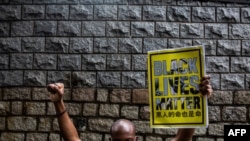China's state media is accusing a local U.S. consulate of "attempting to incite unrest among Africans in Guangzhou" after the Americans hosted a discussion on the Black Lives Matter (BLM) movement last weekend.
The event at the U.S. consulate in Guangzhou titled "Black Lives Matter, Beyond the Hashtag" invited 60 participants to hear two local American residents discuss the history of the BLM movement and their views of how systemic racism continues to affect Black Americans in terms of housing, medical care and employment. The discussion was capped at 60 invitees in order to ensure participants had room for social distancing to prevent the spread of COVID-19.
The U.S. Consulate-General Guangzhou's public affairs officer said in a statement to VOA that the speakers "addressed common misperceptions people have about [Black Lives Matter] goals, which are equality and racial justice."
An article about the English-language consulate event in China's state media Global Times claimed it was attempting to "incite unrest" among the expat Africans living in Guangzhou. Thousands of African immigrants have settled in Guangzhou in recent decades, creating what many believe to be Asia's largest community of African expatriates.
Earlier this year, African businessmen and students living in the area complained of discrimination in how they were treated during the peak of the coronavirus outbreak, saying they were evicted from their homes, denied entrance to restaurants and singled out for coronavirus testing, leading to complaints from their embassies.
Beijing's embrace of BLM in America
Since protests erupted after George Floyd, an African American, died in police custody on May 25 in the U.S. state of Minnesota, the Black Lives Matter movement has drawn international headlines for its push to address systemic racism in America.
Chinese officials have also championed the movement, seeing it as a way to criticize the United States for its track record on human rights issues after months of scrutiny over Beijing's crackdown on pro-democracy protesters in Hong Kong.
"Racial discrimination is a long-lasting problem in the United States," said Chinese Foreign Ministry spokesperson Zhao Lijian in June. "Black lives matter and their human rights should be guaranteed."
Chinese Foreign Ministry spokesperson Hua Chunying tweeted "I can't breathe," a reference to George Floyd's last words, as her response to U.S. State Department spokesperson Morgan Ortagus' criticism of Beijing's Hong Kong policy.
Xinhua, the state-backed media outlet, claimed in a report that "the United States is in pain, anger and the widest unrest for decades over racial injustice," adding African Americans have suffered disproportionately high death rates from the COVID-19 outbreak.
Chinese media have heavily covered the protests and unrest in American cities, painting them as a failure of the country's democratic system.
A spokesperson for the U.S. consulate in Guangzhou told VOA in an email that they regularly host events on a variety of topics related to U.S. history, culture and current events. "We find these events to be a valuable opportunity for us to answer questions from the Chinese public about American institutions, the U.S. government, and the American people, and at the same time we enjoy learning more about China from our guests," the statement said.
But in China, where government censorship is the norm, even an embassy discussion for a few dozen people about an overseas social movement is controversial. Zhu Feng, an international relations professor at Nanjing University, told VOA that although the topic is worth discussing, the timing might be inappropriate.
"I think we should avoid raising such divisive topics during the COVID-19 epidemic. All countries should avoid controversial topics that might incite social unrest," he told VOA.
The U.S. consulate, in a post on its official Weibo account, appeared to respond to the criticism around the event saying that "education is the best way to end discrimination."
Africans in Guangzhou
Guangzhou, the provincial capital of Guangdong province and a commercial hub of 13 million people, is home to Asia's largest populations of Africans. Most of them are traders on travel visas engaged in import-export between China and Africa.
According to official statistics, a total of 86,475 foreigners are currently living in Guangzhou, of whom 13,652 are Africans. But researchers say thousands more are believed to be there illegally.
During the COVID-19 pandemic, it was reported that Africans living in Guangzhou were evicted from their hotels and apartments, and were forced to take COVID-19 tests against their will.
Some told VOA they were barred entrance to stores, detained and singled out to be tested for coronavirus.
Advocates for the Africans say they are being denied basic rights. "We have pictures showing how some people were locked down in their apartments without food. You can't go out on the street if you are black," said Mamane Bashir, spokesman for the Association of Nigerians living in China, in an interview with VOA's Hausa service.
The United States Consulate General in Guangzhou issued a travel warning in April, advising African Americans to avoid traveling to Guangzhou over concerns they could be targeted for quarantine by local officials.
While Black expats living in China drew attention over their treatment during the peak of the coronavirus outbreak, at the time some local Chinese residents complained to VOA that Africans receive better treatment from the local government than China's own citizens.
"Honestly, I think the local government treat them better than us," said local resident Ma Fangmei. "They treat foreigners like dignitaries."
Zhang Xiaoyong, also a Guangzhou resident, said there are two groups of Africans in China. "Rich Africans get preferential treatment from the Chinese government. But if you are just an average citizen, the story is different."







